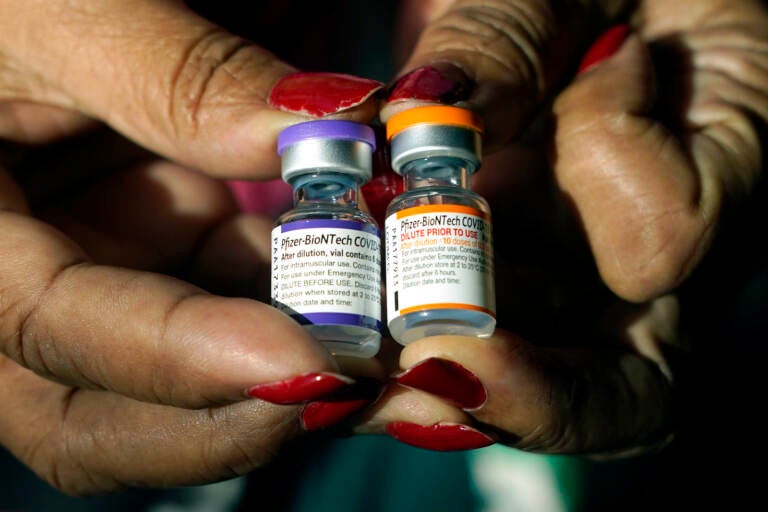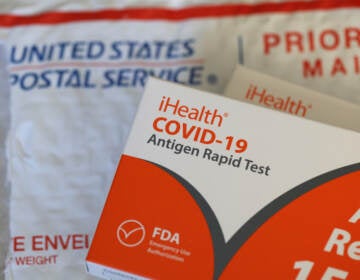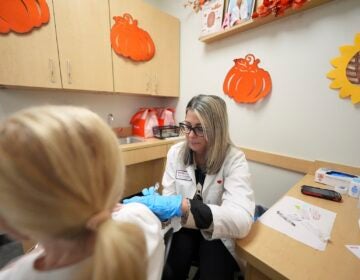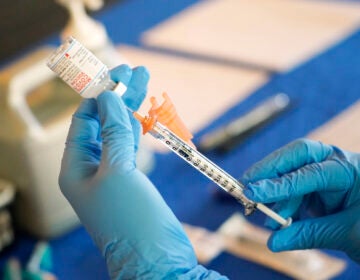FDA clears COVID booster shot for healthy kids ages 5 to 11
The Food and Drug Administration’s action Tuesday now opens a third shot to elementary-age kids, too — at least five months after their last dose.

Jackson-Hinds Comprehensive Health Center nurse Maggie Bass holds a vial of the Pfizer COVID-19 vaccine for children ages 5 - 11 on the right while in her left hand is a vial of the vaccine for adults, in Jackson, Miss., Tuesday, Feb. 8, 2022. (AP Photo/Rogelio V. Solis)
U.S. regulators on Tuesday authorized a COVID-19 booster shot for healthy 5- to 11-year-olds, hoping an extra vaccine dose will enhance their protection as infections once again creep upward.
Everyone 12 and older already was supposed to get one booster dose for the best protection against the newest coronavirus variants — and some people, including those 50 and older, can choose a second booster.
The Food and Drug Administration’s authorization now opens a third shot to elementary-age kids, too — at least five months after their last dose.
There is one more hurdle: The Centers for Disease Control and Prevention must decide whether to formally recommend the booster for this age group. The CDC’s scientific advisers are scheduled to meet on Thursday.
Pfizer’s shot is the only COVID-19 vaccine available for children of any age in the U.S. Those ages 5 to 11 receive one-third of the dose given to everyone 12 and older.
Whether elementary-age children need a booster has been overshadowed by parents’ outcry to vaccinate even younger tots, those under 5 — the only group not yet eligible in the U.S. Both Pfizer and rival Moderna have been studying their shots in the youngest children, and the FDA is expected to evaluate data from one or both companies sometime next month.
For the 5- to 11-year-olds, it’s not clear how much demand there will be for boosters. Only about 30% of that age group have had the initial two Pfizer doses since vaccinations opened to them in November.
But in a small study, Pfizer found a booster revved up those kids’ levels of virus-fighting antibodies — including those able to fight omicron — the same kind of jump adults get from an extra shot.
While the coronavirus is more dangerous to adults than to children, youngsters can get severely ill — and more than 350 children ages 5 to 11 have died, according to CDC’s count.
Adding to public confusion, the CDC estimates 3 out of every 4 U.S. children of all ages have been infected with the coronavirus since the pandemic’s start — many of them during the winter omicron wave. Still, health authorities urge vaccination even in people who’ve previously had COVID-19, to strengthen their protection.
Vaccination may not always prevent milder infections, especially as omicron and its siblings are better than some prior variants at slipping past those defenses. But health authorities agree the vaccinations continue to offer strong protection against the worst outcomes of COVID-19, including hospitalization and death.
___
The Associated Press Health and Science Department receives support from the Howard Hughes Medical Institute’s Department of Science Education. The AP is solely responsible for all content.
WHYY is your source for fact-based, in-depth journalism and information. As a nonprofit organization, we rely on financial support from readers like you. Please give today.




![CoronavirusPandemic_1024x512[1]](https://whyy.org/wp-content/uploads/2020/03/CoronavirusPandemic_1024x5121-300x150.jpg)


